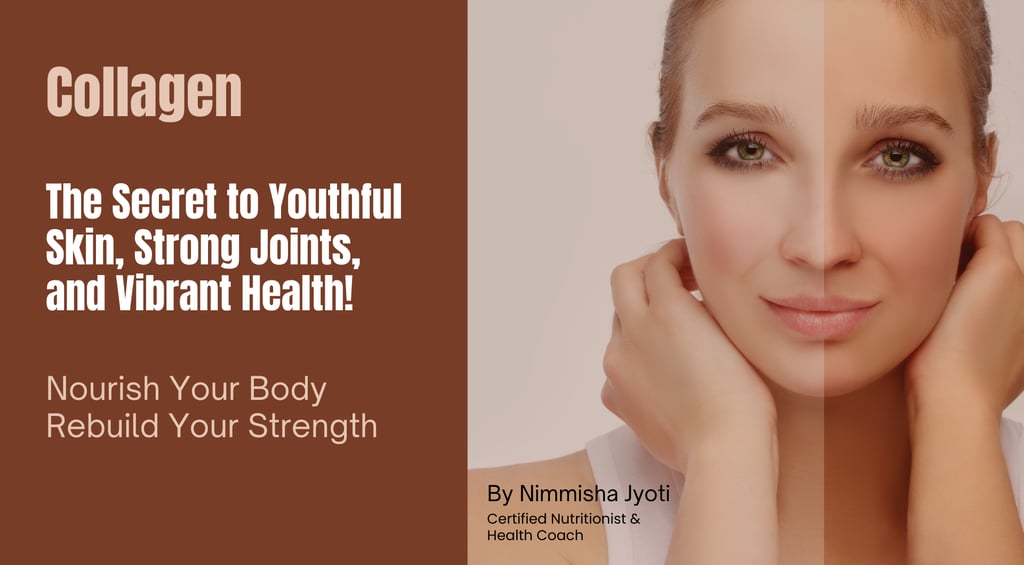Collagen: The Secret to Youthful Skin, Strong Joints, and Vibrant Health!
To keep your skin glowing, joints strong, and overall health in check, start incorporating collagen-rich foods and collagen-boosting nutrients into your daily diet. Eat a variety of protein sources, colorful fruits, and vegetables to naturally support your body's collagen production. Stay hydrated, maintain an active lifestyle, and nourish your body with the right foods for long-lasting health and vitality.


Collagen: The Secret to Youthful Skin and Vibrant Health!
As we age, our body produces less collagen, which leads to noticeable changes in our skin and overall health. One of the first signs is looser, thinner, and wrinkled skin, as collagen is responsible for keeping it firm and elastic. You may also notice dryness and sagging, making the skin look aged. Collagen isn’t just important for the skin—it also keeps our joints, muscles, and tendons strong and flexible. When collagen levels drop, ligaments and tendons become stiff, leading to joint pain and discomfort, which can increase the risk of arthritis. Muscles may also shrink and weaken, making everyday movements feel more difficult.
Low collagen levels can affect digestion, as it plays a role in keeping the gut lining strong. This may lead to stomach problems like bloating, acid reflux, or poor digestion. Additionally, collagen is essential for healthy hair growth, so a decline in collagen may result in thinner hair, slow hair growth, and even baldness over time.
Collagen is the most abundant protein in our body, acting as the building block for skin, hair, nails, joints, and bones. Think of it as the glue that holds everything together, keeping our skin firm, our joints flexible, and our body strong. As we age, our body naturally produces less collagen, leading to wrinkles, joint pain, and weaker bones. This has sparked a growing interest in ways to boost collagen naturally through diet and lifestyle.
Understanding collagen and how to maintain it can lead to better overall health and slow down aging from the inside out!
Understanding Collagen: The Body's Structural Protein
Collagen is the most abundant protein in the human body, comprising approximately 30% of its total protein content. It serves as a fundamental building block, providing structure, strength, and support to various tissues, including skin, bones, muscles, tendons, and ligaments. Beyond these, collagen is also found in organs, blood vessels, and the intestinal lining, underscoring its vital role in maintaining overall bodily integrity.
The Role of Collagen in the Body
Improves Skin Health & Reduces Aging Signs:
Collagen plays a major role in keeping our skin youthful and glowing. It improves skin elasticity and hydration, making it look firmer and reducing fine lines and wrinkles. As we age, collagen production slows down, leading to dryness and sagging. However, by maintaining adequate collagen levels, we can support skin cell regeneration, giving our complexion a healthy, radiant glow and delaying visible signs of aging.
Strengthens Joints & Reduces Pain:
Beyond beauty, collagen is a key component of our joints and cartilage, acting as a cushion that keeps them flexible and pain-free. It helps in reducing stiffness and joint discomfort, making movements smoother. This is especially beneficial for individuals suffering from osteoarthritis and rheumatoid arthritis, as it supports overall joint health and mobility.
Enhances Hair & Nail Growth
If you’ve ever struggled with brittle nails or thinning hair, collagen might be the missing piece. It strengthens nails, preventing them from breaking easily, and enhances hair thickness and growth by supporting keratin production. This results in stronger, healthier hair and nails that don’t chip or split as often.
Supports Bone Health & Density:
Our bones are largely made of collagen, and its presence is crucial in maintaining bone strength and density. It works alongside calcium and vitamin D to improve bone formation, reducing the risk of osteoporosis and fractures as we age. Without sufficient collagen, bones become weaker and more prone to damage.
Boosts Muscle Mass & Strength:
For those aiming to build muscle or recover after workouts, collagen provides essential amino acids that support muscle repair and growth. It plays a significant role in post-exercise recovery, preventing muscle loss, especially in older adults who may experience a natural decline in muscle mass (sarcopenia).
Aids in Gut Health & Digestion:
Collagen isn't just for bones and skin; it also plays a role in gut health and digestion. It strengthens the gut lining, preventing issues like leaky gut syndrome, which can lead to inflammation and digestive discomfort. Many people find that maintaining collagen levels helps reduce bloating, IBS symptoms, and acid reflux, leading to better overall digestion.
Promotes Heart Health:
Heart health also benefits from collagen, as it helps maintain the integrity of arteries and blood vessels, reducing the risk of heart disease. By supporting circulation and blood flow, collagen contributes to better cardiovascular function and helps keep the heart working efficiently.
Improves Wound Healing & Tissue Repair:
If you've ever had a cut, burn, or surgery, collagen plays a vital role in wound healing and tissue repair. It speeds up recovery time by supporting skin regeneration and connective tissue repair, ensuring that wounds heal properly and with minimal scarring.
Supports Brain & Mental Health:
The brain benefits from collagen, too! It contains glycine, an amino acid that helps improve sleep, mood, and cognitive function. Many people find that maintaining good collagen levels reduces brain fog and stress-related inflammation, leading to better mental clarity and overall well-being.
Strengthens Teeth & Gums:
Finally, collagen is essential for strong teeth and healthy gums. It helps maintain gum tissue, preventing issues like receding gums and tooth loss. By supporting enamel strength and dental integrity, collagen contributes to overall oral health, ensuring that your smile stays healthy for years to come.
Citrus Fruits: The Vitamin C Boost for Collagen Production
Citrus fruits like oranges, lemons, limes, and grapefruits do not contain collagen themselves. However, they are rich in vitamin C, which plays a critical role in collagen synthesis within the body. Here’s how:
1. Vitamin C and Collagen Production:
Vitamin C plays a crucial role in collagen production, acting as the key that unlocks the body’s ability to make this essential protein. Collagen is made up of building blocks called amino acids, but without enough vitamin C, the body cannot properly assemble and strengthen collagen fibers. This is because vitamin C is needed for a process called hydroxylation, which helps turn certain amino acids into a stable form of collagen. Without enough vitamin C, the collagen produced is weak and ineffective, leading to fragile skin, weak joints, and poor wound healing. In severe cases, a lack of vitamin C can cause scurvy, a condition where the body’s connective tissues break down, leading to bleeding gums, bruising, and extreme weakness. This is why vitamin C-rich foods like citrus fruits, berries, and bell peppers are essential for maintaining healthy skin, joints, and overall body strength.
2. How Citrus Fruits Help:
Citrus fruits boost natural collagen levels by:
✅ Enhancing proline and glycine conversion into collagen.
✅ Acting as a powerful antioxidant to protect collagen from breakdown by free radicals.
✅ Preventing skin aging, wrinkles, and joint issues by maintaining collagen structure.
3. How to Maximize Benefits:
To increase collagen production, pair citrus fruits with:
Protein sources (chicken, fish, beans) → Provides amino acids needed for collagen formation.
Leafy greens → High in chlorophyll, which helps collagen synthesis.
Nuts & seeds → Contain zinc and copper, which support collagen structure.
Collagen Content in Foods: Natural Sources and Supporting Nutrients
1. Fish: especially parts like skin, scales, and bones, contains collagen. However, specific percentages are not readily available.
2. Chicken: particularly the skin and connective tissues, is rich in collagen. Exact percentages can vary based on the cut and preparation method.
3. Egg Whites: do not contain collagen but are rich in proline, an amino acid essential for collagen synthesis.
4. Citrus Fruits: do not contain collagen but are high in vitamin C, which is crucial for collagen production.
5. Berries: do not contain collagen but provide antioxidants that protect existing collagen in the body.
6. Red and Yellow Vegetables: These vegetables do not contain collagen but are rich in nutrients that support collagen health.
7. Garlic: does not contain collagen but contains sulfur, which helps prevent collagen breakdown.
9. Leafy Greens: do not contain collagen but contain chlorophyll, which may boost collagen production.
10. Cashews: do not contain collagen but provide zinc and copper, minerals necessary for collagen synthesis.
11. Tomatoes: do not contain collagen but are a source of lycopene, an antioxidant that helps protect collagen.
12. Bell Peppers: do not contain collagen but are high in vitamin C, supporting collagen production.
13. Beans: do not contain collagen but provide protein and amino acids required for collagen synthesis.
14. Avocados: do not contain collagen but contain healthy fats and vitamin E, which help protect existing collagen.
15. Soy: does not contain collagen but contains genistein, an antioxidant that may help stimulate collagen production.
Final Words:
Collagen plays a vital role in maintaining healthy skin, joints, muscles, and overall well-being. While natural food sources like fish and chicken provide direct collagen, many plant-based foods support collagen production by supplying essential nutrients like vitamin C, antioxidants, and amino acids. A balanced diet rich in protein, fruits, and vegetables can help the body naturally produce and protect collagen, keeping you feeling and looking youthful. Instead of relying solely on supplements, focusing on a nutrient-dense diet ensures long-term benefits for your skin, bones, and overall health.
To keep your skin glowing, joints strong, and overall health in check, start incorporating collagen-rich foods and collagen-boosting nutrients into your daily diet. Eat a variety of protein sources, colorful fruits, and vegetables to naturally support your body's collagen production. Stay hydrated, maintain an active lifestyle, and nourish your body with the right foods for long-lasting health and vitality. For a personalized health program tailored to your needs, including collagen-boosting diet plans, holistic wellness guidance, and expert nutrition advice, reach out to us today!
Let’s work together to achieve your health, and fitness goals naturally. Take the right step toward a healthier, more vibrant you!
Disclaimer:
The information provided on NutrifyTheWorld blog is for educational and informational purposes only. It is not intended as a substitute for professional medical advice, diagnosis, or treatment. Always seek the advice of your physician or other qualified health provider with any questions you may have regarding a medical condition. Never disregard professional medical advice or delay in seeking it because of something you have read on NutrifyTheWorld blog. The opinions expressed by the experts in this article are their own and do not necessarily reflect the views of NutrifyTheWorld or its affiliates. Product recommendations are based on research and personal experiences, but individual results may vary. Before using any product mentioned on NutrifyTheWorld blog, please read the label and consult with a healthcare professional to ensure it is suitable for your specific needs and conditions. We do not endorse or promote any specific brand or product mentioned on NutrifyTheWorld blog. Any reliance you place on the information provided is at your own risk. NutrifyTheWorld shall not be liable for any loss or damage arising from the use of information on its blog.


